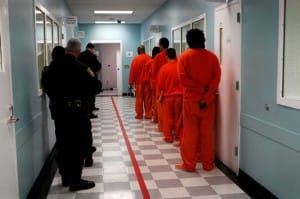by Tamara Barak Aparton
San Francisco – African Americans in San Francisco are more likely to await trial behind bars than their white counterparts and face harsher punishment once convicted, according to a new study commissioned by the San Francisco Reentry Council.

Unlike previous reports on racial disparities, the study went beyond racial disparities in arrests and focused on unequal treatment in the courts as well, said San Francisco Public Defender Jeff Adachi, who co-chairs the Reentry Council.
“The report makes it clear: Racial profiling extends beyond the street and into the courthouse,” Adachi said. “It also shows that San Francisco lags behind the rest of the state in closing the equality gap in its justice system.”
The report, “San Francisco Reinvestment Initiative: Racial and Ethnic Disparities Analysis for the Reentry Council,” was prepared by the nonprofit W. Haywood Burns Institute. Its data shows harsher treatment of Blacks during virtually every step of the criminal justice system in San Francisco.
Researchers looking into treatment of Latinos were hampered by years of poor data collection by San Francisco police, which counted the vast majority of “Hispanics” as white. The result, the study’s authors noted, was a likely inflated rate of justice system involvement for whites, and an underestimation of the disparity gap between Blacks and whites.
Among the findings:
- Blacks are 7.l times as likely as whites to be arrested, 11 times as likely to be booked into County Jail and 10.3 times more likely to be convicted of a crime in San Francisco.
- Despite an overall reduction in arrest rates in San Francisco, the disparity gap between Black and white adults is increasing. Meanwhile, the gap is decreasing statewide.
- Jail booking rates for Blacks and Latinos in San Francisco have increased over the past three years, while booking rates for whites have decreased.
Approximately 83 percent of individuals booked into jail in San Francisco also live in the city, the study found.
“Too often, people dismiss the alarming racial disparities in the San Francisco County Jail by claiming that African Americans from other cities enter San Francisco to commit crimes,” Adachi said. “In fact, it is Black San Franciscans who are being over-policed and over-incarcerated.”
The study found shocking disparities in who is allowed to await trial at home rather than jail, a program known as “pretrial release.” While Black adults were more likely to meet the criteria for pretrial release, they were less likely than white adults to be granted pretrial release by judges.
“Too often, people dismiss the alarming racial disparities in the San Francisco County Jail by claiming that African Americans from other cities enter San Francisco to commit crimes,” Adachi said. “In fact, it is Black San Franciscans who are being over-policed and over-incarcerated.”
African Americans are also more likely to be convicted in San Francisco than their similarly charged white counterparts. The study revealed that for every white adult arrested and convicted in 2013, 1.4 Black adults were arrested and convicted. Black adults were more likely to be sentenced to prison than their white counterparts, and be put on more restrictive forms of probation.
“There is a direct correlation between being denied pretrial release and being convicted,” Adachi said. “People in jail are more likely to plead guilty just to get out, even if they’re innocent. Being allowed pretrial release means being able to hold onto your job, your housing – even your children.”
The study’s recommendations included keeping accurate ethnic and racial data and developing a system to monitor the disparities on a quarterly basis. The reports should be made publicly available and discussed regularly in meetings involving criminal justice officials, community groups and citizens, who should use the results to shape policy and practices in order to reduce the inequities.
Researchers concluded that “the prevalence of these disparities undermines any notion of ‘justice’ in our criminal justice system. Given the disparities in San Francisco outlined in this report, it is incumbent on local stakeholders to address the inequities within the criminal justice system.”
“People in jail are more likely to plead guilty just to get out, even if they’re innocent. Being allowed pretrial release means being able to hold onto your job, your housing – even your children.”
Adachi is currently working with San Francisco Supervisor Jane Kim to secure funding for a Pre-Trial Detention Relief Unit, consisting of two attorneys and two paralegals. The unit would secure alternatives to incarceration for those awaiting trial through pretrial release programs, bail reduction and electronic monitoring.
The entire report can be seen at http://www.sfgov2.org/Modules/ShowDocument.aspx?documentID=2692.
Tamara Barak Aparton, communications and policy assistant in the San Francisco Public Defender’s Office, can be reached at Tamara.Aparton@sfgov.org.





